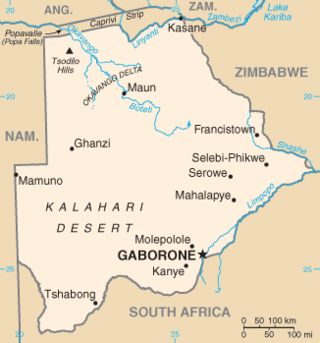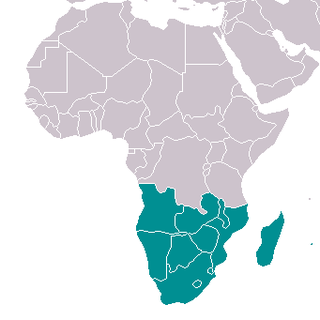
United Nations Security Council Resolution 678 was adopted on 29 November 1990. After reaffirming resolutions 660, 661, 662, 664, 665, 666, 667, 669, 670, 674 and 677, the council noted that despite all the United Nations efforts, Iraq continued to defy the Security Council.

The Internal Settlement was an agreement which was signed on 3 March 1978 between Prime Minister of Rhodesia Ian Smith and the moderate African nationalist leaders comprising Bishop Abel Muzorewa, Ndabaningi Sithole and Senator Chief Jeremiah Chirau. After almost 15 years of the Rhodesian Bush War, and under pressure from the sanctions placed on Rhodesia by the international community, and political pressure from South Africa, the United Kingdom, and the United States, the Rhodesian government met with some of the internally based moderate African nationalist leaders in order to reach an agreement on the political future for the country.
United Nations Security Council Resolution 253, adopted unanimously on May 29, 1968, after reaffirming previous resolutions, the Council noted with concern that the measures taken so far have failed to bring the rebellion in Southern Rhodesia to an end and condemned the recent "inhuman executions carried out by the illegal regime in Southern Rhodesia which have flagrantly affronted the conscience of mankind". After further condemning the regime and calling upon the United Kingdom to end the rebellion in Southern Rhodesia the Council decided that all member states would:
United Nations Security Council Resolution 277, adopted on March 18, 1970, concerned the state of Southern Rhodesia, now known as Zimbabwe. The Council reaffirmed its previous resolutions and noted with grave concern that efforts thus far to bring the rebellion to the end had failed, some countries had not been obeying the Council's resolutions and that the situation in Southern Rhodesia continued to deteriorate as a result of the regime's new measures.

United Nations Security Council Resolution 288, adopted unanimously on November 17, 1970, after reaffirming previous resolutions on the topic, the Council called upon the United Kingdom, as the legal administering Power of Southern Rhodesia, to bring an end to the illegal rebellion. The Council decided that the present sanctions against Rhodesia would remain in place and urged all states to implement all pertinent resolutions and not to grant any form of recognition to the regime.
United Nations Security Council Resolution 314, adopted on February 28, 1972, concerned that certain states were not complying with resolution 253, the Council decided that the sanctions against Southern Rhodesia set out in 253 would remain fully in force. It also urged all states to implement fully resolution 253 and declared that any legislation passed or act taken by any state with a view to permitting the importation of any commodity from Southern Rhodesia falling into the scope of 253 would undermine the sanctions and be contrary to the state's obligations under the United Nations Charter.
United Nations Security Council Resolution 318, adopted on July 28, 1972, after reaffirming previous resolutions on the topic, the Council approved the recommendations of the committee established in resolution 253. The Council then condemned all acts violating the provisions of the previous resolutions, called upon all states continuing to have economic and other relations with Southern Rhodesia to stop immediately and demanded that all member states scrupulously carry out their obligations under the previous resolutions. The Resolution then requested the Secretary-General provide all appropriate assistance to the committee established in resolution 253.
United Nations Security Council Resolution 326, adopted on February 2, 1973, concerned with provocative and aggressive acts committed by Rhodesia against Zambia and disturbed by the continued military intervention of South Africa in Rhodesia, the Council condemned all acts of provocation and harassment against Zambia.
United Nations Security Council Resolution 327, adopted on February 2, 1973, reaffirmed previous resolutions on the topic of Rhodesia and commended Zambia for its decision to immediately enforce sanctions. The United Nations plan to crush the Rhodesian government relied heavily on sanctions, Zambia had decided to enforce the sanctions when other nations chose not to despite the large impact the cessation of trade with Rhodesia would have on the Zambian economy. The Council decided to send the special mission established by resolution 326 to assess the needs of Zambia in maintaining alternate forms of communication and traffic, as most of it had flowed through Rhodesia in the past.
United Nations Security Council Resolution 333, adopted on May 22, 1973, after reiterating previous statements and admitting that previous measures had yet failed to bring about the end of the "illegal regime in Southern Rhodesia" the Council condemned South Africa and Portugal for failing to co-operate with the implementation of sanctions and requested that urgent action be taken to implement them. The Council then requested that states with legislation permitting importation from Rhodesia repeal it immediately and called upon states to enact and enforce legislation against any person who tries to evade of commit a breach of sanctions by:
United Nations Security Council Resolution 386, adopted unanimously on March 17, 1976, noted statements made by the President and Minister for Foreign Affairs of the People's Republic of Mozambique and also expressed its concern regarding the situation created by the provocative, aggressive acts committed by the illegal minority regime in Rhodesia. The Council reaffirmed their earlier work regarding Rhodesia, including their resolutions imposing sanctions on that country and noted their appreciation with Mozambique's co-operation with that plan. The Resolution then condemns Rhodesia's aggressive acts, including military incursions, against Mozambique and noted the urgent and special economic need of Mozambique who arose from its implementation of resolution 253.
United Nations Security Council Resolution 388, adopted unanimously on April 6, 1976, reaffirmed previous resolutions on the topic, including the conclusion that the situation in Rhodesia constituted a threat to international peace and security. The council decided to expand its sanctions regime to include;
United Nations Security Council Resolution 409, adopted on May 27, 1977, reaffirmed the Council's previous resolutions and affirmed that the policies created by them would remain in place. The Council, acting under Chapter VII, further decided that all member states should prohibit the use of funds in their territory from use by Rhodesia and/or Rhodesian citizens, save for pensions. The Resolution also decided that the Committee established in Resolution 253 (1968) should examine possible uses of Article 41 of the Charter of the United Nations.

United Nations Security Council Resolution 403, adopted on January 14, 1977, after hearing representations from the Minister of External Affairs of Botswana, condemned attacks by the "illegal minority regime" in Southern Rhodesia. The resolution recalled previous resolutions on the topic, including the right to self-determination of the people of Southern Rhodesia.
United Nations Security Council Resolution 411, adopted unanimously on June 30, 1977, noted statements made by officials of the People's Republic of Mozambique and also expressed its concern regarding the situation created by the provocative, aggressive acts committed by the illegal minority regime in Rhodesia. The Council reaffirmed their earlier work regarding Rhodesia, including their resolutions imposing sanctions on that country and noted their appreciation with Mozambique's co-operation with that plan. The Resolution then condemns Rhodesia's aggressive acts, including military incursions, against Mozambique and noted the urgent and special economic need of Mozambique who arose from its implementation of resolution 253.

United Nations Security Council Resolution 424 was adopted unanimously on March 17, 1978; after hearing representations from Zambia, the Council expressed concern at unprovoked attacks against the country by the "illegal racist regime" in Southern Rhodesia, which resulted in deaths and destruction of property in Zambia. The Rhodesian Security Forces maintained that they had been attacking guerrilla bases in the country.

United Nations Security Council resolution 445, adopted on 8 March 1979, after recalling resolutions 253 (1968), 403 (1977), 411 (1977), 423 (1978), 424 (1978) and 437 (1978), and hearing representations from various countries, the council expressed its concern about the military operations undertaken by the "illegal regime" against countries both bordering and non-contiguous with Southern Rhodesia. The council was also indignant at the execution and sentences against persons under repressive laws.

United Nations Security Council resolution 448, adopted on 30 April 1979, after recalling resolutions 253 (1968), 403 (1977), 411 (1977), 423 (1978), 424 (1978), 437 (1978) and 445 (1979), the Council declared that the recent "sham" elections held in Southern Rhodesia by the "illegal racist regime" were illegal and the results thereof would be null and void.
United Nations Security Council resolution 460, adopted on 21 December 1979, after taking note of the Lancaster House Agreement, the council decided to terminate measures taken against Southern Rhodesia in resolutions 232 (1966) and 253 (1968) and any subsequent resolutions. The resolution deplored the "loss of life, waste and suffering" over the past 14 years caused by the rebellion in southern Rhodesia.





